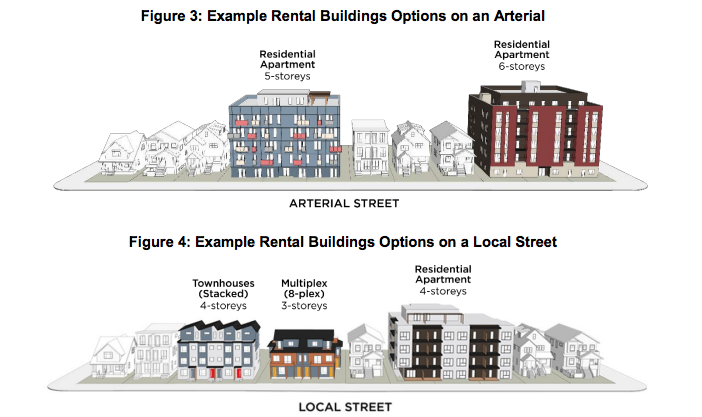
Dec 16, 2021: Streamlining Rental Plan gets green light in 10-1 vote
After years of planning, three days of public hearings, and hundreds of correspondences from supporters and opponents, Vancouver City Council has passed its Streamlining Rental Plan (SRP). In UKRA’s opinion, the SRP reimagines Vancouver’s once vibrant neighbourhoods as a taller, blander, denser—yet no more affordable— more uniform city of multi-storey rental apartment buildings along highly populated transit corridors.
Council approved the plan in a 10-to-1 vote at its Dec. 14 meeting, with Cllr. Colleen Hardwick the lone holdout.
The SRP is arguably one of the most important and divisive issues to go before Council in recent years, even drawing legal action from one Kitsilano homeowner. The plan proposes changes to both commercial and residential zoning across the city to allow for 4,000 new developments over 10 years.
Early in the meeting, Cllr. Hardwick told Council that continual rezoning of land affects land inflation, which is at the root of the city’s affordable housing crisis. “It (the SRP) will make housing less affordable.” She then proposed an amendment to refer the SRP back to staff for further study on how the policy will affect speculation and land value, and that other forms of housing could be considered, such as co-ops, duplexes, and affordable home ownership.
In a moment of clear frustration, Cllr. Adriane Carr countered that the motion had already been referred back to staff more than a year ago and that according to staff surveys and consultation, 77% of Vancouver residents support the SRP. Hardwick’s amendment failed in a 9-2 vote, with Cllr. Melissa De Genova the other no vote.
Prior to the final vote, Mayor Kennedy Stewart called the decision a “watershed moment” for Councillors. “This city is hurting,” he told them. Stewart warned his colleagues that the vote will clearly demonstrate which Councillors are serious about supporting an increase in housing. “Those who are not serious, those who are pretending to care, will vote no,” he said.
Cllr. Christine Boyle said the SRP brings up “huge” questions of equity and fairness. For years, renters have been used as a buffer between noisy thoroughfares and existing homeowners, she said. Renters deserve to live on off-arterials in secure rental housing, “not in basement suites.” Ironically, most renters will continue to be used as buffers as much of the new housing in the SRP will be built on arterials. Many secondary suites are located in houses off-arterials.
Cllr. Melissa De Genova had concerns that the rezoning would cause a rise in property tax in surrounding areas, forcing many long-time residents to sell their homes. She asked if staff had consulted with BC Assessment. Assistant Director of Planning Dan Garrison said staff had not contacted the provincial tax authority because they went with the recommendations of urban development consultant, Coriolis Consulting Corp. Blair Erb of Coriolis told Council that the rezonings would have no impact on land value, and that no speculation is expected.
Cllr. Michael Wiebe’s amendment to create a nominal fixed-rate community amenity contribution (CAC, a fee from developers that goes towards paying for public amenities such as parks and community centres) for market-rental projects also failed, though the second half of Wiebe’s amendment requesting further study of a new CAC passed in the final vote.
Many questions remain unanswered for UKRA. Can City surveys be trusted? Should we believe that 77 per cent of Vancouverites support the SRP? What will it look like? Will the new housing be affordable? From everything we’ve heard, the SRP may create only a very small amount of affordability. As Jean Swanson admitted, Tuesday night’s decision won’t solve the affordability crisis. It won’t help the people who work at Starbucks, she said.
In other City news
The City of Vancouver voted to raise 2022 property taxes by 6.35 per cent, despite earlier promises to cap the tax at five per cent or below. It translates to about $178 for the average home, and $72 for the average condo. The City says the hike was necessary to increase public safety and climate action.
“I’m choked as I continue to see us add more and more [to property taxes]. It was bad enough that we were looking at five per cent,” said Cllr. Colleen Hardwick. Councillors Lisa Dominato and Melissa De Genova shared Hardwick’s concerns. Cllr. Christine Boyle, however, said the hike is not a broken promise and that Council is simply investing in the promises they’ve made all year.
The decision came in a close 6 -5 split vote, with Mayor Stewart, Councillors Christine Boyle, Adriane Carr, Peter Fry, Michael Wiebe and Jean Swanson in support and Councillors Colleen Hardwick, Rebecca Bligh, Melissa De Genova, Lisa Dominato and Sarah Kirby-Yung in opposition.
Council also approved a proposal by Mayor Stewart, which comes after his failed Parking Permit Climate Emergency plan. The goal is to raise $100 million over 10 years to fund the city’s climate change initiatives. Some of these include improvements to transit infrastructure, walking and cycling, retrofits, and increased electric vehicle chargers. The environmental levy will be added to property tax bills beginning in 2022.



No Comments